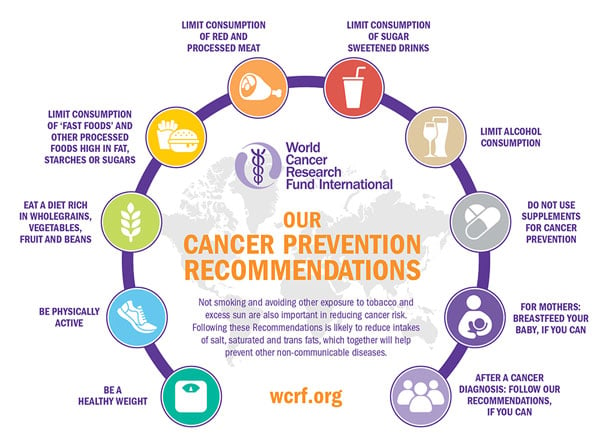For cancer prevention, it’s best not to drink alcohol.
One of our Cancer Prevention Recommendations is to limit alcohol consumption. For cancer prevention, it’s best not to drink alcohol.
There is strong evidence that consumption of alcoholic drinks is a cause of cancers of the mouth, pharynx and larynx, oesophagus (squamous cell carcinoma), liver, colorectum, breast (pre- and postmenopause), and stomach.
There is also strong evidence that consumption of alcoholic drinks helps protect against kidney cancer. However, this finding is far outweighed by the increased risk for other cancers.
The evidence shows that alcoholic drinks of all types have a similar impact on cancer risk. This Recommendation therefore covers all types of alcoholic drinks, whether beers, wines, spirits (liquors) or any other drinks, as well as other alcohol sources.
The important factor is the amount of alcohol (ethanol) consumed. Even small amounts of alcoholic drinks can increase the risk of several cancers. There is no threshold of alcohol consumption below which cancer risk does not increase, at least for some cancers.
If you do consume alcoholic drinks, do not exceed national guidelines.
> See graphics and more in our toolkit.
Implications for other diseases
Our Cancer Prevention Recommendations represent a package of ways of life which, together, can make an enormous impact on people’s likelihood of developing cancer and other chronic diseases over their lifetimes.
– Professor Martin Wiseman, World Cancer Research Fund International’s Medical and Scientific Adviser
A whole-of-government, whole-of-society approach is necessary to create environments for people and communities that are conducive to limiting alcohol consumption.
A comprehensive package of policies is needed to reduce alcohol consumption at a population level, including policies that influence the availability, affordability and marketing of alcoholic beverages. Policymakers are encouraged to frame specific goals and actions according to their national context.
> Find out more on policy action for cancer prevention.
Our Recommendations work together as an overall way of living healthily to prevent cancer.
> Download a PDF that details all the information about our Recommendations
